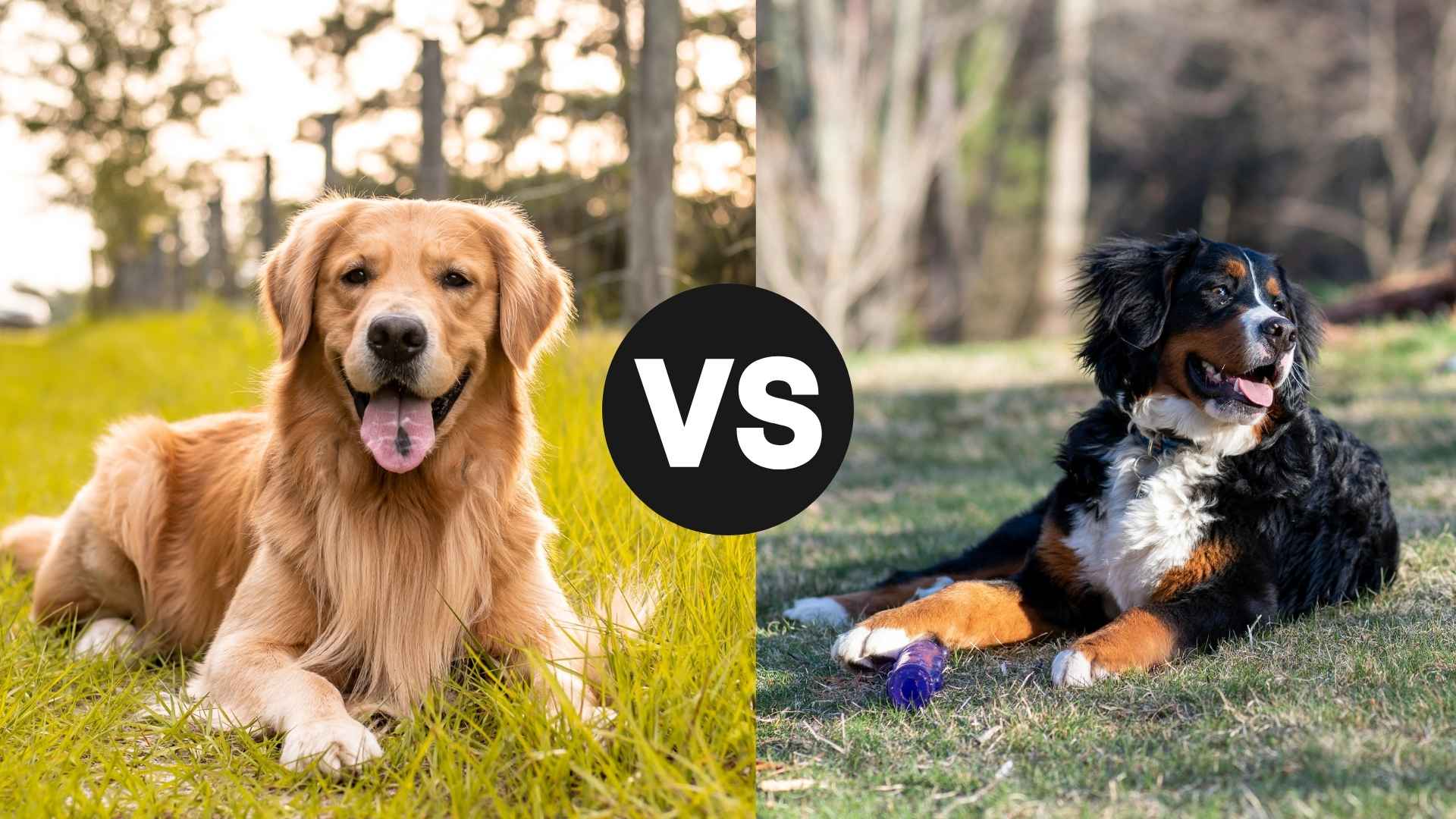If you’re looking for a big-hearted, big-bodied dog to complete your family, you’ve probably come across two of the most beloved breeds out there: the Golden Retriever and the Bernese Mountain Dog. Both are large, fluffy, and famously affectionate—but when it comes down to choosing the right one for your lifestyle, the differences start to matter.
One is an all-American favorite known for fetching tennis balls and starring in family movies; the other is a majestic, mountain-born beauty with a calm demeanor and soulful eyes. They’re both loyal, loving, and incredibly devoted—but they don’t come with the same energy levels, grooming needs, or health considerations.
In this guide, we’ll walk you through everything you need to know to make the best choice for your home, your schedule, and your heart. Whether you’re drawn to the Golden’s sunny smile or the Bernese’s regal elegance, by the end, you’ll know which one is your perfect canine companion.
Golden Retriever vs. Bernese Mountain Dog
Trait |
Golden Retriever |
Bernese Mountain Dog |
|---|---|---|
|
Size |
55–75 lbs (large) |
70–115 lbs (larger) |
|
Temperament |
Friendly, eager, social |
Calm, gentle, loyal |
|
Trainability |
Very high |
Moderate, can be sensitive |
|
Energy Level |
High – loves activity |
Moderate – enjoys relaxed routines |
|
Good with Kids |
Excellent |
Excellent |
|
Other Pets |
Very friendly with early socialization |
Good with early socialization |
|
Coat Care |
Weekly brushing |
Frequent grooming |
|
Lifespan |
10–12 years |
6–8 years |
Golden Retriever vs. Bernese Mountain Dog: Breed History
According to the AKC, the Golden Retriever has roots in 19th-century Scotland, where it was originally bred to retrieve waterfowl and game from marshy terrain. Developed by crossing Tweed Water Spaniels with various setters and retrievers, the Golden was created for endurance, intelligence, and a soft mouth. From hunting fields to therapy hospitals, this breed has evolved into one of the world’s most versatile and popular dogs.
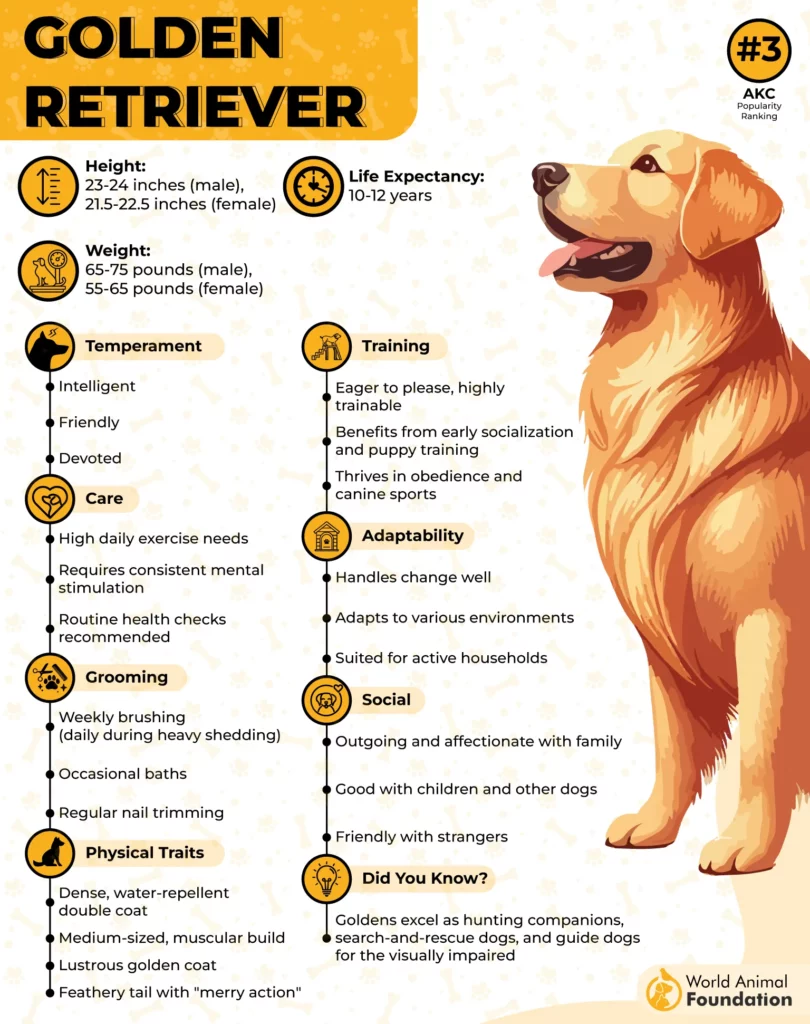
In contrast, the Bernese Mountain Dog hails from Switzerland, specifically the mountainous regions around Bern. Known as a working dog, the Berner was used to pull carts, guard property, and herd livestock. Its ancestry is even older than the Golden’s, thought to be descended from Roman mastiff-type dogs brought to the Alps nearly 2,000 years ago.
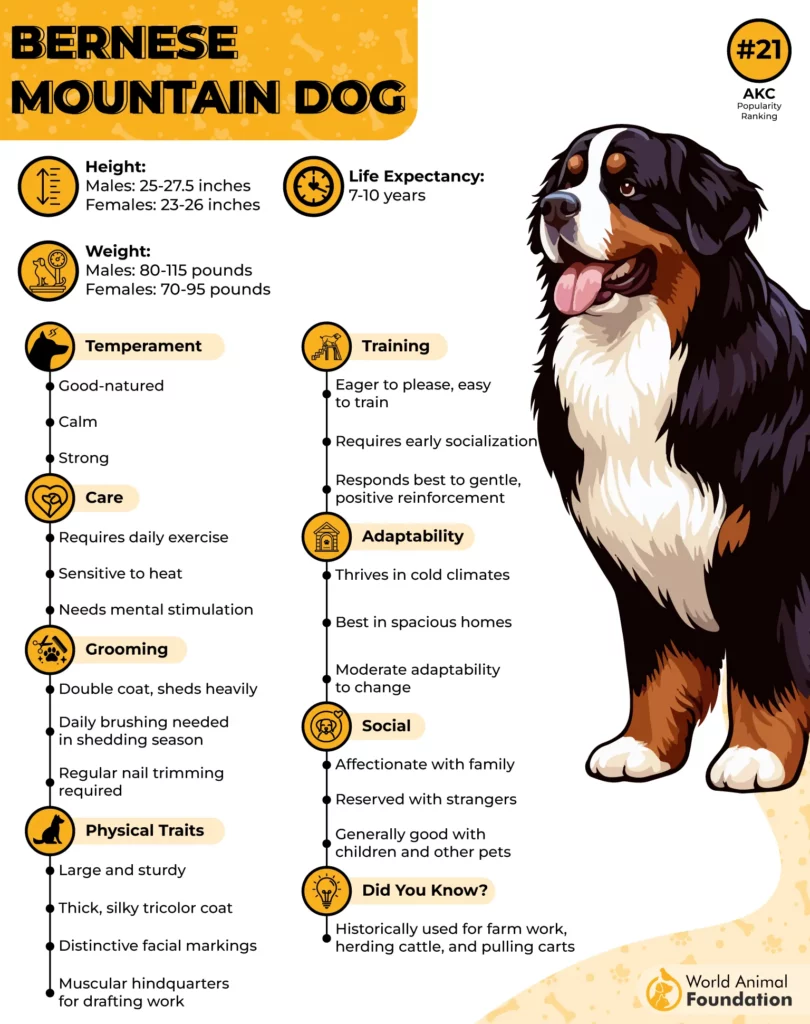
Where Goldens were bred for retrieving, Berners were bred for draft and guarding, giving them a naturally steadier, slower-paced temperament. Their purposes were different, but both breeds were developed to work closely with humans—something you can still feel in how tightly they bond with their families.
Today, both breeds are recognized by the American Kennel Club, with Golden Retrievers consistently ranking in the top five most popular breeds. Bernese Mountain Dogs are less common but are growing in popularity, especially among those looking for a gentler giant with a calm spirit.
Golden Retriever vs. Bernese Mountain Dog: Personality
This is where things get fun—because both of these dogs are total sweethearts, just in different ways.
Golden Retrievers are famously friendly, endlessly outgoing, and always ready for action. They’re the life of the party—tail wagging, tongue lolling, ball in mouth, hoping you’ll play just one more round of fetch. They’re extroverts through and through, thriving on social interaction, positive reinforcement, and being the center of attention.

Bernese Mountain Dogs, on the other hand, are more reserved. As per PetMD, they’re affectionate with their families but may take a little time to warm up to strangers. While they enjoy attention, they don’t seek it out as aggressively as Goldens do. Think of the Berner as the gentle giant who prefers calm over chaos, peace over play.
Both breeds are great with children, making them wonderful family dogs. However, Goldens tend to tolerate more chaos and are better suited for households with high energy and lots of movement. Berners are better for families who enjoy a slower pace, and they often do better in more spacious, quieter homes.
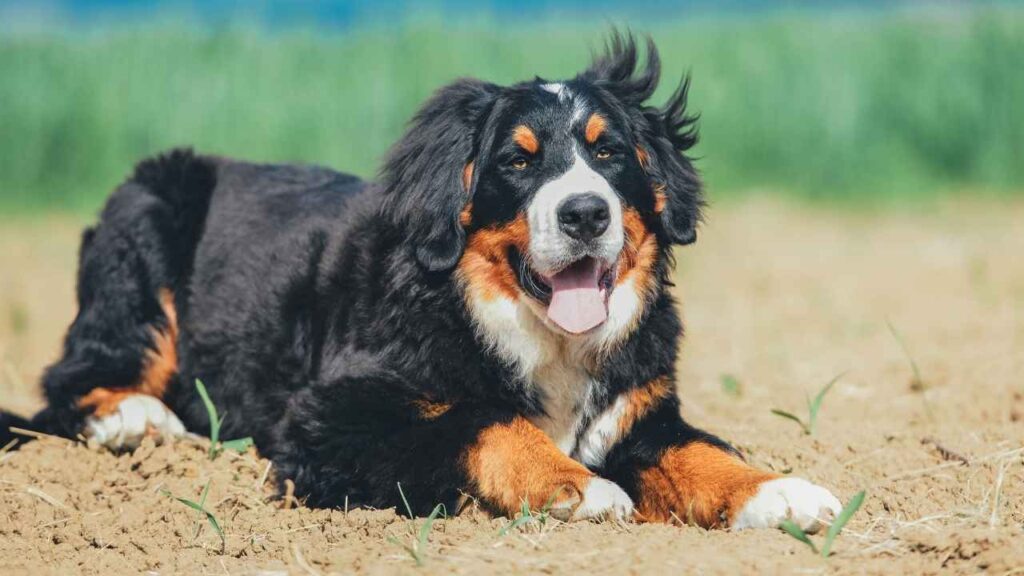
When it comes to trainability, both are very smart, but Goldens edge ahead thanks to their eagerness to please and high food motivation. Berners are intelligent too, but they’re more sensitive and can become discouraged with harsh tones or too much pressure. Gentle, consistent training works best for both.
Golden Retriever vs. Bernese Mountain Dog: Coat Care Requirements
There’s no getting around it—both breeds are fluffy. But how much grooming are you really signing up for?
The Golden Retriever has a thick, water-repellent double coat that sheds year-round and heavily during seasonal changes. Their feathered legs, tail, and chest require regular brushing—at least a few times a week—to prevent mats and reduce loose fur around the house. Baths every 4–6 weeks and occasional trims help keep their coat clean and healthy.
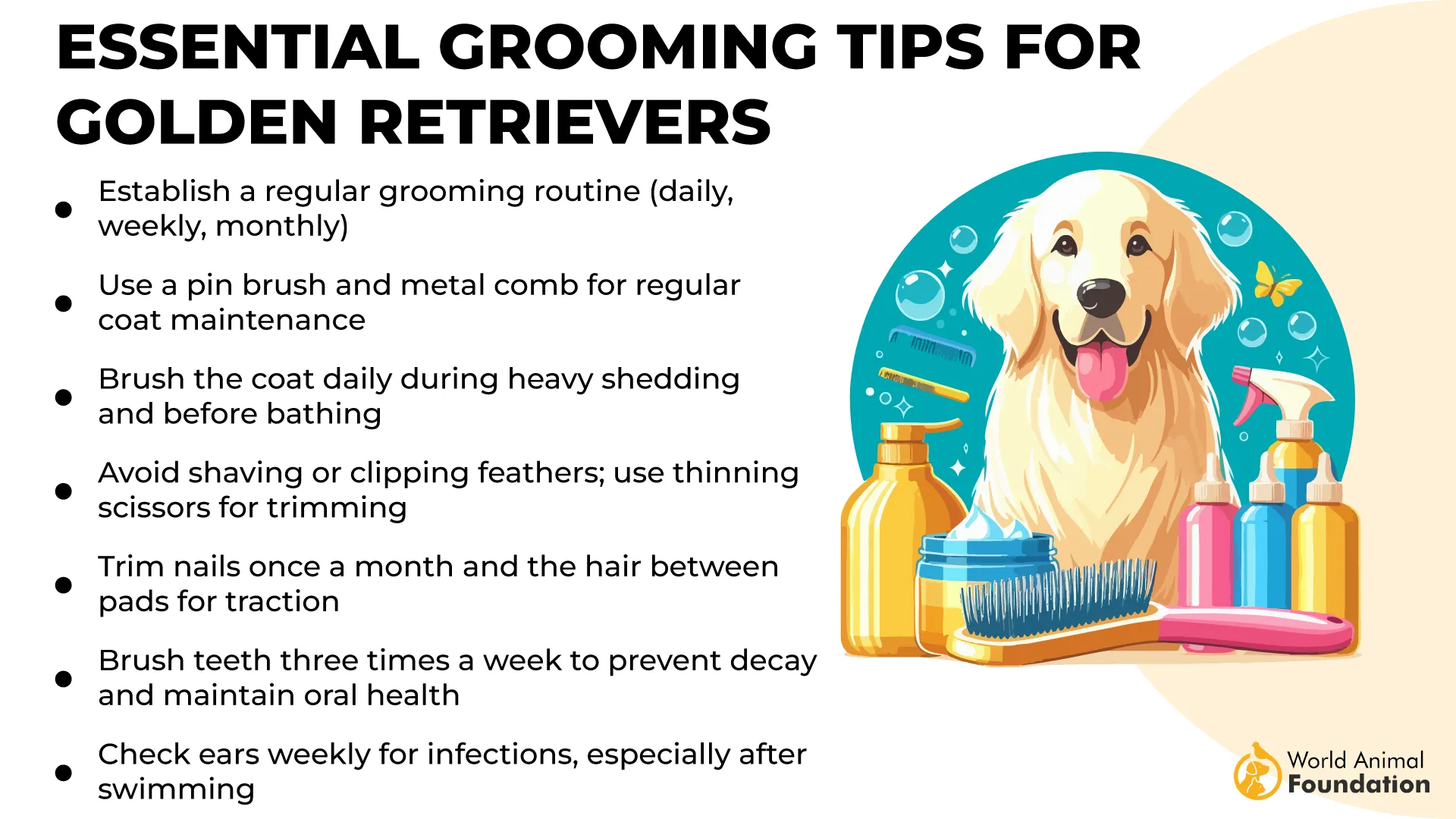
Bernese Mountain Dogs have an even thicker, longer double coat that’s built for alpine weather. Their fur is slightly wavier than a Golden’s and tends to attract more dirt and debris. Weekly brushing is a must, but during shedding season (which is no joke), you’ll want to increase it to daily sessions.
Berners also need special attention behind the ears, under the legs, and along the tail—places where tangles and mats can form quickly. A slicker brush, an undercoat rake, and a strong vacuum will become your best friends. Berners are considered heavier shedders overall.

One major bonus: both breeds love grooming time if introduced early and positively. Turning brushing into bonding is easy with these two—it just needs to be part of your routine from day one.
Golden Retriever vs. Bernese Mountain Dog: Health Issues
Unfortunately, big dogs tend to come with big health concerns, and these two are no exception.
Golden Retrievers are prone to hip dysplasia, elbow dysplasia, and certain cancers, particularly hemangiosarcoma and lymphoma. Their floppy ears can also lead to ear infections if not kept dry and clean. On the plus side, their active nature keeps them in good shape as long as they’re exercised and fed properly.

Bernese Mountain Dogs, though, have one of the shortest average lifespans among large breeds. They are especially prone to cancer, particularly histiocytic sarcoma, as well as hip and elbow dysplasia, bloat, and progressive retinal atrophy. It’s crucial to work with a breeder who performs comprehensive health screenings and avoids inbreeding.
One big difference is how long these health problems tend to take to show up. Goldens may begin developing issues in middle age, while Berners often face problems earlier in life. This can make preventative care and insurance more important for Berner owners.
Both breeds benefit from joint supplements, regular vet visits, and weight management to reduce stress on their bodies. Daily exercise, quality nutrition, and early screening tests go a long way in helping them live longer, happier lives.
Golden Retriever vs. Bernese Mountain Dog: Life Expectancy
This category is often a dealbreaker, especially for families hoping for a long-term furry friend.
The Golden Retriever typically lives 10 to 12 years, with some healthy individuals reaching 13 or 14. Their moderate size, active nature, and widespread popularity have helped veterinarians better understand their health needs, improving their care over time.
The Bernese Mountain Dog, heartbreakingly, lives only 6 to 8 years on average. Despite being loving, well-mannered, and gentle, their short lifespan often deters potential owners who aren’t ready for such a brief journey. Some Berners live longer, especially with strong genetics and excellent care—but even then, 10 years is considered exceptional.

If longevity is a top priority, the Golden is the safer bet. However, many Berner owners say the depth of love and loyalty packed into their shorter lives makes it more than worth it. They often describe their bond with a Berner as “intensely special,” despite the limited time.
In either case, these are dogs who form strong attachments and deserve to be part of your daily life, from hikes and cuddles to vet appointments and senior care. No matter how long they’re with you, they’re sure to leave pawprints on your heart.
Conclusion
Both the Golden Retriever and the Bernese Mountain Dog offer loyalty, love, and that irresistible big-dog charm—but which one fits your life best depends on your needs and priorities.
If you’re looking for a dog with unmatched eagerness to learn, the trainability of Golden Retrievers gives them a clear edge. Their intelligence and patience are exactly why they’re so often chosen as guide dogs and therapy dogs, offering not only companionship but also real-world assistance and emotional support. Their famously friendly Golden Retriever temperament makes them easy to live with, eager to please, and safe around young kids, strangers, and even other animals.
Bernese Mountain Dogs, while slightly more reserved, are equally affectionate and thrive in calm, spacious households. They do best with early socialization to build confidence and comfort around other dogs and new situations. Their size and gentle demeanor make them fantastic for families looking for large dogs that are protective without being aggressive.
Ultimately, both breeds are great family dogs, but the Golden may be better suited for first-time owners, active families, and homes with kids or other pets. The Berner, meanwhile, will flourish with a laid-back routine, loving attention, and room to stretch those big, furry paws.
Whichever you choose, you’re gaining more than a pet—you’re welcoming a best friend who’s devoted for life.


